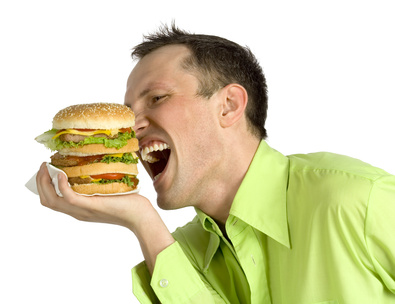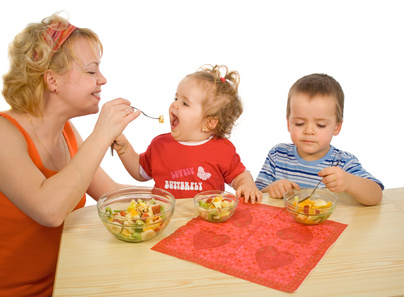What is Mindful Eating?
A health article about mindful eating from Your Health Online the A to Z directory of dealing with Health Problems & nutritional Self Care Strategies

Have you heard 'mindful eating' mentioned online in regard to improving your health and wondered what that could mean? Well, we’re living in unusual times. It’s more important to focus on health than
ever before and that is affected by our habits good and bad.
Stress can lead to poor eating habits. It’s no secret that
many people turn to food during times of high anxiety. This can result in
overeating and poor food choices.
Food can be enjoyable and a promoter of good health at the same time.
The idea of mindfulness has been circulating for thousands of years but has only become a popular topic in the Western world recently.
What is mindfulness? It’s simply using your attention in an intentional way.
If you’re awake, your attention is on something. It might be a TV show, something outside your window, your thoughts, your dog, the pain in your foot, the temperature of the room, or folding your laundry.
You can’t help but have your attention on something. Even when you’re meditating, you’re focused on something.
However, if you’re having a conversation, but thinking about your weekend plans, you’re not being mindful.
Mindfulness involves paying attention to the present moment.
So, if you’re having a conversation, you’re paying attention to the conversation. You’re also noticing when your attention wanders.
What does mindfulness have to do with eating? Everything.
Guide To What Mindful Eating Is

Mindful eating is simply eating with your full awareness on your food and the entire eating process.
Most people sit down for a meal and mindlessly fills themselves up. They often overeat because they aren’t paying attention to whether they’re full or not.
They eat unhealthy food because they haven’t given serious thought to the nutritional value of their meal they’re about to eat.
Their mind isn’t on their meal. They’re thinking about the bills that need to be paid. They might be watching TV. They might even be driving down the road while eating a meal.
This is the exact opposite of mindful eating.
Mindful eating has several components:
1. Hunger.
Ask yourself before you start eating, “Am I hungry?”
If you’re not hungry and you’re not planning on climbing a mountain later that day, you’re probably better off not eating.
Your body is very adept at telling you when it requires more food.
Consider these questions:
If you are hungry, how hungry are you?
Should you be hungry based on your recent eating activity?
How much food do you think it will take to satisfy you?
What are
you hungry for? Is that a healthy option?
2. Nutritional Value.
Before eating anything, think about the nutritional value of that food.
Roughly
how many calories is it? Is it a food high in carbohydrates? Is it high in
fat? Does it contain a lot of vitamins and minerals, or is it basically
junk food?
What are your current goals regarding your health and body weight?
Does this food
help you to achieve those goals, or will it move you in the opposite
direction?
3. Project into the future.
Most people only consider how a food is going to make them feel while they’re eating it.
They fail to consider how they will feel physically and
emotionally after the act of eating has concluded.
Before you
eat something, ask yourself how you’ll feel immediately afterwards,
and how you’ll feel an hour or two later.
4. Appearance.
What does the food look like? What color is it? Is it appealing? How is the food arranged on the plate?
Based on the appearance, how do you anticipate the food will taste and feel in your mouth?
5. Smell.
What do you smell? Can you smell the spices used in the food?
How do you anticipate the food
will taste based on the smell? Can you tell how hot the food is by
bringing it close to your nose?
6. Taste.
It’s time to finally
taste your food. Feel your jaw moving. Notice how your tongue is involved
in the eating process.
Take your time and chew your food thoroughly. Depending on what you’re eating this might require quite a bit more time than you’re used to.
It’s a lot
easier on your body to digest food that’s been chewed very thoroughly.
Notice the
flavor of the food. Describe the taste to yourself.
7. Texture.
What does the food feel like in your mouth? Is it crunchy? Hot? Cold? Slimy? Soft? Describe the texture to yourself.
Pay attention to the texture after you’re done
chewing and about to swallow. What does your food feel like now?
8. The effect on your mind and body.
Foods can affect your mood and your body.
For
example, most people find the taste of chocolate to be very soothing. Hot,
spicy foods can be invigorating and make you sweat.
You might find that
foods containing gluten make you feel bad mentally and/or physically.
Maybe you feel guilty about eating animal products.
Notice the
effects that your meal has on your mind and body during and after the
meal. Pay attention for two hours after the meal and rate how you feel.
9. Presence.
Are you paying attention to the overall eating process? Or is your mind somewhere else? Are you having a lively debate at the dinner table?
Are you watching a
movie in the background? Listening to music? Playing a game? Worrying
about your finances? Thinking about work?
If you’re
eating mindfully, you’re not thinking about, or paying attention to,
anything outside of the meal.
This
doesn't mean it’s necessary to ignore your family during a meal but keep
the distractions to a minimum and focus on your meal. You can chat more
or play a game afterwards.
No phones,
radios, TVs, tablets, computers, books, or games while you’re eating.
Mindful eating is putting your full awareness on the eating experience.
It goes beyond the items listed above. It also includes understanding your eating habits, evaluating hunger, choosing the right foods for you, eating the proper amounts, and being fully engaged with the eating process while you’re eating.
“With mindfulness, you can establish yourself in the present in order to touch the wonders of life that are available in that moment.”
- Thich Nhat Hanh
The Benefits of Mindful Eating

Mindful eating is a powerful process that delivers significant results to your health, life experience, and psychology.
Eating is the most important input you have to influence your body. When you become an expert at eating, you’re going to have positive results.
Enjoy the many benefits of eating mindfully:
- Greater health. When you
develop the ability to eat mindfully, you’re much more likely to eat
healthy foods in the proper amounts and at appropriate times. The result
is greater health.
- Weight loss. Mindful eating
greatly reduces the likelihood of obesity and can lead to significant
weight loss.
- Better digestion. When you
eat healthy foods, eat them slowly, chew them thoroughly, and avoid
overeating, your digestion improves significantly as a result.
- Higher resistance to eating disorders. Eating disorders are at the opposite end of the spectrum from
mindful eating. While this guide is not intended to be a treatment for
eating disorders, it can be an effective preventative measure. Mindful
eating is a healthy way of eating that puts food in a positive
perspective.
- Greater control over eating habits. Mindlessness leads to abuse. When you look at food accurately and
objectively, it’s easier to behave in a positive manner. Mindful eating is
a set of healthy habits that also helps to break an unhealthy relationship
with food.
- Better understanding of yourself. When you examine your behavior, habits, and motivations, you
learn more about yourself. Most of us are oblivious to ourselves. It’s
only through a careful study of yourself that you can truly learn about
yourself.
- Development of mindfulness skills that can be
applied to other parts of life. Mindfulness is a
universal skill that can impact every part of your life in a positive way.
Mindfulness will increase your life satisfaction.
- Enjoy meals more. Meals are more enjoyable if you pay attention to them. Meals are also more enjoyable when you know that you’re in control, and that you’re doing what’s best for your health.
There’s no downside to mindful eating.
If you take the time to master this skill, you’ll see numerous benefits in all parts of your life.
What you learn from eating mindfully can be applied to other parts of your life. Mindful eating affects your mind, body, and life experience for the better.
“Awareness is the key to everything. I think it's important to be aware of how you feel. How do you feel after you exercise? How do you feel after you eat something? I try to be mindful of the food I'm putting in my body, the products I use, and what I put in or on my body.”
- Lauren Bowles
Discovering Your Eating Cycle

Understanding the what, when, why, how, and where of your eating patterns will permit you to be much more mindful of your eating now and in the future.
If you’ve never given thought to your eating
patterns and choices, now is the time to investigate them.
Consider these questions to
learn about how you approach food and eating:
- Why do you eat? Your
immediate response might be related to hunger or keeping yourself alive.
But you’d be surprised how many other reasons that you might have for
eating.
- Make a list
of all the reasons you eat. You could even ask yourself this question
before each snack and meal for the next few days. Record your answers.
- When do you eat? Do you eat
at certain times of the day? During certain activities, such as watching
TV, sitting with friends, or taking a break from work? Are there certain
moods that trigger you to eat?
- For the
next couple of days, track when you eat. Notice the time of day and the
general circumstances.
- Where do you eat? The car?
Dinner table? Couch? Track this for a week or so, too.
- What do you eat? Does the
time of day, circumstance, mood, location, and reason for eating impact
your food choices?
- What foods do you like?
- What foods do you dislike?
- What is your favorite unhealthy food? Why?
- Are you more likely to eat poorly in the car than when you eat at home?
- Do you eat more junk food while watching TV?
- Do you eat better in the morning or at night?
- Do you eat better when in a good mood versus a bad mood?
- Do you eat better when you’re alone or with others?
- Do you eat better at home or at a restaurant?
- Notice when
you’re most likely to eat nutritiously – or not.
- How do you eat? There are
many ways to eat the same food.
- Do you eat quickly or slowly?
- Do you normally eat alone or with others?
- Small bites or large?
- Do you pay attention to your food, or are you daydreaming?
- Do you eat for enjoyment or for health?
- Do you take many small drinks during a meal?
- Do you eat one food on your plate until it’s gone before moving on to another?
Become an expert on your own eating habits and methods. This is great practice for paying attention to your eating. It’s also very informative.
It’s much easier to eat well and maintain a healthy weight if you know the times and circumstances in which you're most likely to eat nutritiously or give in to unhealthy foods.
Knowing your motivations for eating is important, too.
You’ll be surprised by what you learn if you go through this process. With this information, you’ll be in a much better position to eat properly and maximize your health.
“Unhealthy eating habits cause major health problems, such as diabetes and heart disease, and can also lead to food insecurity, disrupted eating patterns, and low self-esteem.”
- Matt Cartwright
Risk Factors: Stress-Related Eating

There are biological reasons that so many people eat when stressed. When a person is physically or emotionally stressed, the body releases a hormone called cortisol.
Cortisol does a lot of things, including increasing food cravings for foods high in sugar or fat.
Stress also increases the hormones that produce feelings of hunger. Stress is harmful to your mind and body.
It’s especially important to be mindful during those periods of time you’re experiencing stress.
Stress makes it much more like that you will:
1. Experience hunger even though you’ve already had plenty to eat.
Eating when your
body doesn’t need food increases the chance of unintentional weight gain and can
negatively affect your health.
Just because you’re hungry doesn’t mean you should eat. Hunger is a signal that you should consider eating. So, consider it. But if you’ve already had enough to eat, make the decision to pass.
2. Eat when you’re not hungry.
If eating makes you feel better, your brain doesn’t care if you’re hungry or not. It will make eating seem like a great idea.
Unfortunately,
eating when your body doesn’t need food leads to weight gain, which contributes
to the development of many diseases.
3. Eat unhealthy foods.
Under stress, many people will resort to eating all sorts of things they know they shouldn’t eat.
Chips,
ice cream, processed meats, sweets, and other unhealthy foods suddenly become
even more appealing than they usually are.
4. Eat too much.
Eating while stressed is likely
to result in overeating. And not only do you eat too much, but you’re likely to
be eating unhealthy foods.
5. Eat in a way that makes you feel even worse.
If you’re eating when your body
doesn’t need food, and you’re eating foods that aren’t good for you, you’re
almost certainly going to feel worse after you eat than you felt before you
started.
6. Eat mindlessly in general.
Stress takes your mind off the eating experience. You’re more likely
to find yourself eating while watching TV, watching YouTube videos, thinking
about whatever is causing you stress, or daydreaming.
Stress is a part of life now more than ever. It’s easy to allow your eating patterns to get out of control when you’re stressed.
You’re more likely to crave
unhealthy foods or eat when you’re not even hungry. Stress and poor eating
habits are strongly linked.
Learn more about what stress is and how to manage stress.
“I learned very early that our health is always impaired by some excess either of food or abstinence, and I never had any physician except myself.”
- Giacomo Casanova
Strategies to Prevent Eating Poorly During Stressful Times:

Keep track of your food intake.
If you’re feeling stressed on a regular basis, and many people are these days, it’s a good time to track your food intake.
There are plenty of free apps, such as MyFitnessPal, that make it very easy to keep track of your calories, macronutrients, and even exercise.
Having an actual number to look at makes it easier to gauge if you have a legitimate reason to eat.
Assess your hunger.
Are you
really hungry? Take an objective look at your hunger. Did you eat
recently? Have you been engaged in a lot of physical activity since you
last ate? Do you actually feel hungry, or do you just have the urge to
eat?
If you’re not hungry, do your best not to eat.
If
you simply have to eat in spite of not truly needing to, try eating
something that’s healthy but has minimal calories. Lettuce, other greens,
celery, broccoli, and cauliflower are a few examples of foods that are
practically calorie free.
Make healthy choices.
If
you’re feeling stress, but it actually is time to have a meal, focus more
than ever on eating healthy foods. It’s so easy to eat poorly during
stressful times that your food selection is especially important.
Healthy
foods will allow your mind and body to deal with stress more effectively. And the last thing you need is to create even more stress by
eating poorly and becoming sick.
Eat slowly.
One of the most
effective ways to avoid overeating is to eat slowly. Very slowly. Decide
that you’re going to take small bites and chew ridiculously slowly. Chew
your food at least 30 times.
Take a
small drink of water between each bite. That’s
water, not juice, soda, or anything else.
Eat without distraction.
No
radio, chatting, TV, cell phone, or
books. It’s just you and your food.
Relieve your stress in other ways.
If you don’t have a legitimate biological need to eat, it’s best not to eat.
Regardless of how tough you are, you must deal with the stress that’s pushing you to eat, or you’ll eventually fail.
You’ll eventually
give in if you don’t find something else to do. Some stress-relieving
ideas are:
- Go for a walk.
- Read a book.
- Find a yoga class on TV and participate.
- Call someone.
- Clean your garage.
- Meditate.
- Take a nap.
- Take a hot shower or bath.
Stress-related eating is very common, but that doesn’t mean you have to allow stress to affect the way you eat.
Stress affects the way you feel compelled to eat, but you can choose to eat mindfully instead.
Mindful eating is a way to combat stress-related eating and its negative effects on your diet and health.
“When you eat mindfully, by paying attention to what you eat, you get more pleasure with fewer calories.”
- Dean Ornish
How Food Affects Your Mood

Your brain never stops working. It’s even furiously working away while you sleep. It never gets a break. Because it’s always working, it requires a constant supply of nutrition.
So, it only makes sense that the quality of the nutrition you’re providing impacts the functioning of your brain. The food you eat affects your brain and your mood.
Just as a car runs best on clean, high-quality fuel, your brain runs best when it’s fed properly.
A low-quality diet doesn’t just create physical issues, such as heart disease, obesity, and diabetes. It can also create brain-related issues that influence your mood.
There is a field of medicine called nutritional psychiatry. This area of medicine addresses the impact of food on mood and behavior.
See how food can have a major impact on your mood:
Serotonin is produced primarily in the gut.
Serotonin is a neurotransmitter that’s involved in regulating
appetite, sleep, pain inhibition, and the mediation of moods.
The hundreds of millions of neurons in the intestinal tract are influenced by the serotonin produced in the gut. It’s believed that 95% of serotonin is produced in the gut.
The bacteria in your gut are an important influencer of your mood.
The good bacteria in your gut help to protect you from the bad bacteria.
They help to properly seal the
interior of your intestinal tract from the rest of your body.
They also
help to control inflammation throughout the body.
They even
affect the neural pathways between your brain and your gut.
A diet high in processed food increases the likelihood of depression by as much as 35%.
Areas of the world that eat minimal amounts of processed foods have a far lower incidence of depression.
It’s likely that there are other psychological
issues that are influenced by diet.
What you put into your body affects your brain and your mood.
Mindful eating can reduce the likelihood of suffering from depression and help to stabilize your mood.
The food for your body is akin to the gas for your car. Using the proper fuel has a lot of benefits.
There is more detailed information here about how nutrition fights disease with food.
“Man seeks to change the foods available in nature to suit his tastes, thereby putting an end to the very essence of life contained in them.”
- Sai Baba
Treatment/Therapy: Applying the Ideas of Nutritional Psychiatry to Yourself

You might not be a nutritional psychiatrist, but you don’t need to be. You don’t have to be a certified personal trainer to do some pushups and go for a run.
You can gain a tremendous amount of insight
and progress from doing some simple experimenting on yourself.
Use these strategies to experiment
with how various foods affect your body:
Rate yourself.
Make a list of qualities you consider to be important that could be food related. Rate yourself for each quality on a 1-10 scale.
Here are a few ideas:
- Ease of falling asleep
- Quality of sleep
- Body weight
- Ability to focus and concentrate
- Overall mood
- Anxiety
- Energy
- Memory
- Mental sharpness
- Physical comfort or pain levels
- Blood
sugar, blood pressure, or other symptoms current ailments
- Give
yourself a rating for all of these characteristics before you begin your
two-week experiment.
Eliminate all potentially unhealthy foods for two weeks.
For two weeks eliminate all processed foods, nuts, dairy, alcohol, and added sugar. A processed food is anything that doesn’t occur in nature.
So, no pasta, bread, crackers, soda, flour,
sugar, and so on.
- While olive
oil is considered to be acceptable, eliminate other oils for two weeks.
- So, what
does that leave than you can eat? Eat these foods:
- Meat in
its natural form. So, no sausage, hotdogs, bratwurst, or any meat that
has things added to it.
- Beans.
Rice and potatoes are okay but provide little nutrition and significant
calories.
- Fish
- Vegetables
- Fruit.
Watch your sugar intake. Treat fruit as a dessert.
- Water
After two weeks, rate yourself again.
You’ll probably find that you feel fantastic compared to how you
normally feel after just a few days. You’ll feel even better after two
weeks.
It’s time to rate yourself again. Go back through your list and give yourself a new rating.
Unless you already ate extremely well to begin with, you’re going
to see some positive changes.
Consider adding back in certain foods.
You’ve eliminated foods that were causing you issues, but you also eliminated foods that weren’t a problem.
It’s time to find out which
foods are problematic, and which are not.
- Stay away
from junk food These are foods like chips, ice cream, candy, and fried
chicken.
- However, if
you love nuts, dairy, bread, or pasta, you might be able to eat these
without a significant penalty. In fact, dairy and nuts can be healthy,
but many people have issues with them.
- Here’s the
plan: Add back one food at a time. After three days, rate yourself again.
If your numbers don’t get worse, feel free to continue eating it. Of
course, a lower score means you should skip that food.
- Only add
back one food at a time! Otherwise, your results won’t give you any
useful information. You won’t know if only one food is bothering you, two
of them, or all of them.
- Keep in mind that if one gluten-containing food bothers you, it’s likely that all of them will.
With some simple and patient experimentation, you can find the foods that work best in your body.
In just a few weeks, you can feel considerably better physically and psychologically. This information is invaluable when applied to your mindful eating practice.
“Science and mindfulness complement each other in helping people to eat well and maintain their health and well-being.”
- Thich Nhat Hanh
Self Care Strategies: A Suggested Process for Eating Mindfully

You might be wondering how to put all of this information together. Let’s explore a simple, but thorough, mindful eating process.
Feel free to adapt these suggestions to fit your own preferences and situation.
A successful mindful-eating process will consider all of the bases:
- Shop mindfully. If you want
to eat healthy food, it’s necessary to have healthy food in the house. If
you want to avoid unhealthy food, keep it out of your house. Think about
the healthiest foods you like to eat and have them available to you at
home.
- Weigh yourself each morning. Your body weight is an important number. That doesn't mean you
need to target a specific number, but it’s important to know which
direction your weight is moving. It’s hard to know how much to eat if you
don’t have a clue what your weight is doing.
- Determine if you should eat. Are you actually hungry? If not, don’t eat. If you are hungry,
determine whether you’re actually hungry or just stressed.
- If you
think you’re hungry, try this: Think of a healthy food you consider
neutral. This is a food you don’t particularly like, but don’t mind
either. Would you eat that if it were your only option? Or would you
prefer to not eat if that was the only food available? This will tell you
if you’re actually hungry.
- Consider
that if you were truly starving, you’d eat anything. You’d even eat a
food you despise and be grateful for it! Now, you don’t have to wait
until you’re starving to eat, but if you’re willing to eat half a pizza,
but would turn down an apple and a salad, you’re not hungry yet.
- If you’re
not hungry, find something else to do. Refer to Chapter 3.
- Determine what you’re going to eat. So, you’ve established that you’re hungry and it’s time to eat.
The next step is to decide what you’re going to eat.
- What are
your health conditions? For example, if you’re diabetic, a low-carb meal
is probably a better option than a high-carb meal.
- What should
you eat? Eat the most nutritious food that sounds good to you that
considers your health conditions.
- A meal
should be healthy and leave you feeling satisfied. Choose accordingly.
Again, if there are no healthy foods that sound good to you, you’re
probably not hungry.
- Determine how much you’re going to eat. Decide how much food you need. What have you done for the last
several hours? What are you planning on doing over the next several hours?
When did you last eat? When will you eat again?
- Make a
conscious decision about the quantity of food that you’ll eat.
- Sit down and eat. Eat your
meal mindfully. Remember to eat slowly, chew thoroughly, and notice the
taste, smell, and texture of your food. Keep your attention on your meal.
Notice when you start to become full and then stop.
- Reflect on how you feel. Do you feel overly full? Did that meal make you feel good? Stressed? Nauseous? What did you learn from eating that meal?
Once a meal is completed, there’s no reason to be thinking about food until it’s time to eat again.
Pay attention to what you’re doing throughout the day. Otherwise, you might miss your life.
“A wise man should consider that health is the greatest of human blessings, and learn how by his own thought to derive benefit from his illnesses.”
- Hippocrates
Tips For Creating the Mindful-Eating Habit

Eating mindfully is a big change for most people. Maybe you’re used to standing in the kitchen and eating a frozen pizza while you watch YouTube videos.
Moving from that experience to eating at the table, chewing slowly and thoroughly, focusing on your food, and eating in silence might be a bridge too far for a single step.
Instead, try implementing one aspect of mindful eating at a time:
● Focus on chewing your food very slowly for several days.
● Spend a week putting your full attention on the eating experience.
● Make a real effort to choose your foods mindfully.
● Track your food intake for a week. Notice the quality of the food and the number of calories.
● Only allow yourself to eat while hungry.
Break down mindful eating to its individual components and become skilled at each one before moving on to another. Slow progress is a million times better than no progress.
It’s not a race.
Another important activity is to practice mindfulness throughout the day. Strive to be mindful in everything you do.
Mindfulness is a skill, and skills require practice to master. Every activity can be mindfulness practice for every other activity.
Mindfulness in general is a great way to reduce stress and experience more of your life.
“Life expectancy would grow by leaps and bounds if green vegetables smelled as good as bacon.”
- Doug Larson
Few people eat in a manner that anyone could label as “mindfully”. Given the important role that food plays in your health, it’s important to eat mindfully and intentionally.
The times we live in have a major impact on social opportunities, personal finances, the health of businesses, and certainly health.
No one can be certain what the future holds, but there are some things you can control.
One of those things is your diet. Eating healthy foods in adequate amounts at effective times will have a huge impact on your health.
One of the most effective ways to accomplish this is to eat mindfully.
Eating mindfully will teach you a lot about yourself. It will also provide the opportunity to change your eating habits in a positive way.
It can also lead to dramatic changes in your health and aid in weight loss.
Becoming mindful in all aspects of your life can greatly increase life satisfaction.
Get the most from your life with mindfulness.
Vitamin & Nutrient Associations
Even when we try to eat well, we're disadvantaged. The nutritional
content of most food has been compromised over the years, not only by
deficient soils and modern production, transportation, storage and
processing methods, but also by the enormous amounts of chemical and
artificial substances added to promote growth, storage life, taste and
appearance.
It's for this reason that more and more medical authorities are
advocating the use of vitamin and mineral supplements. However, finding
them in the right combination can be both confusing and costly.
The nutrition products I am going to recommend you make use of knowledge
gained from the botanical world's 6,000 year history. They incorporated
health building nutritional herbs with the best modern technology to
help our bodies cleanse and detoxify so that the cells - the tiniest
living units - can be as fully nourished as possible.
This allows the cells to grow,
repair and to perform their functions with the best possible efficiency
so that we feel and look better and are more able to prevent and fight
disease. Once the body begins to clear itself of toxins it can more
efficiently absorb nutrition.
Further reading through our articles on health issues will give
you a body of information that will help you decide what options you
have to deal with the underlying causes of your problem through giving
your body the nutrition products that will assist you body to heal from
the inside out.
You can visit our health food products page here: Herbalife Health Nutrition Supplements and learn more about our core nutrition program, the Cellular Nutrition Advanced Program and also check out these targeted products, Florafiber to replace your healthy flora and Aloe Vera Juice to help cleanse your system.
Also using NouriFusion Skin Essentials will clearly help provide you with excellent skincare support for your ‘outer nutrition’.
We wish you well in your search for solutions to this problem and your movement towards better health in all areas.
More Resources available about mindful eating:
Below here are examples of Health Success
Results other people have had with using a self care strategy for
dealing with this condition:
We would be very interested to hear your result stories with your problem if you are using some of our nutrition products. To send us your story just fill out the form below.
Share *YOUR* remedy & health success story!
We are on a world-wide mission to source and tell our readers about as many as possible of the natural remedies & self care strategies available, so please help us to grow and improve our health information on this subject.
If you have a proven home remedy or natural treatment or have a great Health Success story, we would love to share it with our readers.
And as a special "Thank You" for your contribution, we will give you our special edition "Health Success Report"!
(When you submit this article you agree to the ***GENERAL RELEASE below this form)
See below here what stories & resources have been contributed on this subject:
Click below to see contributions from other visitors to this page...
Learn How to Eat Slower Step By Step to Lose Weight
If you've been trying to lose weight, you've probably heard advice about eating more slowly. Reducing the pace can be difficult until you form new habits. …
The Surprising Truth about Zombie Eating and Your Health
Does zombie eating sound like a new diet rich in brains? It may be scarier than that. It's what happens when you combine screen time with meals and snacks, …
Who Else Wants a Simpler Way to Stay Healthy?
You would have to have considerable knowledge of science and math to calculate your VO2max when working out, and figure out how much to consume of each …
7 Strategies for Making Mindfulness a Way of Life
Mindfulness is a popular subject these days. While there are many proponents of mindfulness extolling its many virtues, there’s a lack of information on …
Creative Mindfulness: 20+ Strategies for Wellness & Recovery
Dr. Jamie Marich wrote a book called Creative Mindfulness: 20+ Strategies for Wellness and Recovery as a way to help people achieve an overall sense of …
Enhance Your Health and Waistline with Mindful Eating
There are very few people that eat mindfully, and it shows. The obesity rate for those over 20 years of age is 40% in the United States! In Canada, the …

*** GENERAL RELEASE AND ASSIGNMENT
For good and valuable consideration, the receipt
and legal sufficiency of which is hereby acknowledged, I ("I", "me",
"my") hereby agree as follows:
1) I hereby grant to Warren Tattersall, his successors, assignees and
licensees the unlimited right, but not the
obligation, to use any statements made by or attributed to me (my
"Statements") as well as my name, voice, and likeness, performance,
personal characteristics and other identifying information (jointly and
severally with the Statements and the photographs referenced in
Paragraph 2 below, my "Personal Characteristics") in and in connection
with the advertising, promotion, marketing and other exploitation of
Herbalife products or Warren Tattersall’s services in any and all
languages and media, now known or hereafter devised, throughout the
universe in perpetuity.
2) If I supply Warren Tattersall with photographs of myself on this date
or any date subsequent, I agree that Warren Tattersall may use such
photographs to the full extent provided above, I warrant and represent
that I am the person depicted in the photograph, I am the owner of the
photograph, I have the authority to grant the permission and rights
granted herein, and no one else’s permission is required to grant such
rights, and I understand that the copy of the photograph(s) I supply to
Warren Tattersall will not be returned.
3) I understand that Warren Tattersall is not obligated to use my
Personal Characteristics as permitted herein or, if commenced, to
continue with such use in any territory. I acknowledge and agree that
Warren Tattersall may make my Personal Characteristics available to
Warren Tattersall’s independent distributors to use as permitted above.
4) In undertaking the act of submitting my words and images through
www.TheHealthSuccessSite.com I understand that I am agreeing the terms
and conditions of this agreement
I have read this entire General Release and Assignment and fully
understand his contents. I likewise understand that this document shall
remain in full force and effect unless/until I request that it be
terminated, and that any such request must be made in a signed writing.
By signing below, I hereby acknowledge and agree to the
foregoing.
I understand that in submitting my material for publication I am granting the rights to reproduce this material on the internet or in other form and I have read the conditions above
BACK TO “Your Health Online”
the A to Z directory of dealing with Health Problems & Self Care Strategies for natural remedies to your health issues.
Terms of Use | Privacy Policy | Disclaimer | Site Map
====================================================
SITE DISCLAIMER: Do these products “cure” anything? Of course
not… but it stands to reason that if you cleanse your body and feed it
the finest nutrition available, giving it everything it needs in
balance, on a daily basis, that your body will do what nature intended,
and give you the best possible chance to fend off sickness and disease.
This mindful eating information is not presented
by a medical practitioner and is for educational and informational
purposes only. The mindful eating content is not
intended to be a substitute for professional medical advice, diagnosis,
or treatment. Always seek the advice of your physician or other
qualified health provider with any mindful eating
questions you may have regarding a medical condition. Never disregard
professional medical advice or delay in seeking it because of something
you have read.
The mindful eating resources on this site are not intended to be a substitute for professional advice. While all attempts have been made to verify mindful eating information provided in this publication, neither the author nor the publisher assumes any responsibility for errors, omissions or contrary interpretation of the web site mindful eating subject matter herein.
The site mindful eating contents are solely the opinion of the authors and should not be considered as a form of advice, direction and/or recommendation of any kind. If expert advice or counseling is needed, services of a competent professional should be sought. The author and the Publisher assume no responsibility or liability and specifically disclaim any warranty, express or implied for any mindful eating products or services mentioned, or any techniques or mindful eating practices described.
The purchaser or reader of this mindful eating publication assumes responsibility for the use of these materials and information. Neither the author nor the Publisher assumes any responsibility or liability whatsoever on the behalf of any purchaser or reader of these mindful eating nutritional supplements materials. There is no guarantee of validity of accuracy. Any perceived slight of specific people or organizations is unintentional.
This website and its
creators are not responsible for the content of any sites linked to.
Since natural and/or dietary supplements are not FDA approved they must
be accompanied by a two-part disclaimer on the product label: that the
statement has not been evaluated by FDA and that the product is not
intended to "diagnose, treat, cure or prevent any disease."
====================================================
the A to Z directory of dealing with Health Problems & Self Care Strategies for natural remedies to your health issues.

Subscribe to get your weekly "Health Success Magazine" with a new complete & comprehensive Health Report in every edition!

to “Your Health Success”
our weekly F’R’E’E’ Newsletter
If you would like a free no-obligation private consultation or to contact Warren Tattersall for more information, please click here >> Contact Us



